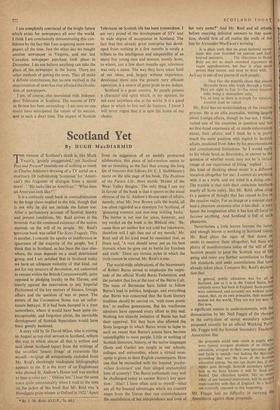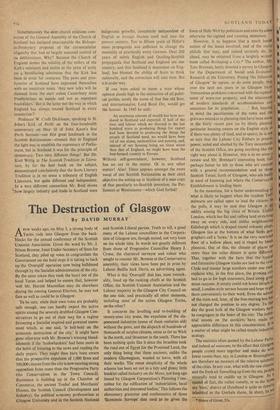Scotland Yet
By HUGH MacDIARMID Trumour of Scotland's death is, like Mark tsr Twain's, 'greatly exaggerated,' yet Scotland Past and Present* reminds me of nothing so much as Charles Addams's drawing of a TV aerial on a mortuary. Or (substituting 'Scotsman' for 'Ameri- can') this fragment of dialogue from a recent novel : "He looks like an American." "What does an American look like?"' It is a curiously small book in contradistinction to the huge claim implied in the title, though that is not why he did not include the future too. After a perfunctory account of Scottish history and present conditions, Mr. Reid arrives at the bromide that the continued existence of the nation depends on the will of its people. Mr. Reid's 'previous book was called The Scots Tragedy. This is another. I concede the apathy or indifference or ignorance of the majority of the people, but I think that in Scotland, as has been the case else- where, the issue depends on a small determined group, and I am satisfied that in Scotland today we have an adequate minority of that kind, out not for any measure of devolution, not concerned to remain within the British Commonwealth, quite opposed to pledging loyalty to the Throne, and utterly ,against the reservation to any Imperial Parliament of the key matters of finance, foreign affairs and the question of 'war or peace. The return of the Coronation Stone was an unfor- tunate betrayal. If it had been dumped in a river somewhere, where it would have been quite un- recognisable, and forgotten about, the inevitable development of Scottish Separatism would have been greatly hastened.
A story told by Sir David Milne, who is retiring in August as top civil servant in Scotland, reflects the way in which almost all that is written and said about Scotland (apart from the writings of the so-called 'lunatic fringe' of extremists like myself—writings all scrupulously excluded from Mr. Reid's shockingly inadequate bibliography) appears to me. It is the story of an Englishman who phoned St. Andrew's House and was startled to hear a voice say: "Oskins 'ere.' I hear the same voice quite unmistakably when I read in the note on the jacket of this book that Mr. Reid was 'a Newdigate prize-winner at Oxford in 1922.' Apart • By J. M. Reid. (0.U.P., Ts. 6d.) from its suggestion of an unduly protracted adolescence, this piece of information seems to me as revealing as the fact that among the long list of honours that follows Dr. C. J. Shebbheare's name on the title page of his book. The Problem of the Future Life, there stands 'Master of the Wear Valley Beagles.' The only thing I can say in favour of the book is that it spares us the usual obverse of the St. Andrew's House state of affairs, namely, what Mr. Ivor Brown calls the world, all too often regarded as a synonym for Scotland. of 'gloaming roamers and non-stop tickling Jocks.' The matter is not one for jokes, however, and my verdict on the book is the Biblical one: 'Be- cause thou art neither hot nor cold but lukewarm, therefore will I spit thee out of my mouth.' Mr. Reid and all his kind must be reminded that, as Ibsen said, 'A man should never put on his best trousers when he goes out to battle for freedom and truth.' There are certain styles in which the truth cannot be uttered. Mr. Reid's is one.
The world-wide celebrations of the bicentenary of Robert Burns served to emphasise the inepti- tude of the official World Burns Federation, and the paradox that lies at the root of the Burns Cult. The mass of Burnsians have failed to follow Burns's lead in politics, language, and everything else. Burns was concerned that the Scots literary tradition should be carried on, 'with more poetic fire,' to endless generations. But his vociferous admirers have opposed every effort to this end. Nothing not abjectly imitative of Burns has had their approval. Yet they have also allowed the Scots language in which Burns wrote to lapse to such an extent that Burns's poems have become unintelligible to most people. Little or nothing of Scottish literature, history, or the native languages (Scots and Gaelic) are taught in our schools, colleges and universities, where a virtual mon- opoly is given to their English counterparts. How can that be reconciled with the boasted 'preefer- vidum Scotorune and their alleged unexampled love of country? The Burns enthusiasts may well be challenged today to answer Burns's key ques- tion: !Alas! I have often said to myself—what are all the boasted advantages which my country reaps from the Union that can counterbalance the annihilation of her independence and even of her very name?' And Mr. Reid and all others, before essaying defeatist answers to that ques- tion, should first of all realise the truth of the late Sir Alexander MacEwan's warning : It is plain truth that no great national move- ment was ever founded oil caution and half- hearted measures. . . . The objections to Home Rule arc, not so much reasoned arguments as vague apprehensions, but fear is often more potent than reason, and must be dealt with.
As I say in one of my poems of such people : . . • They fear the possible chaos that always
threatens those who break through a form; They are right to fear it--for every creation risks being a destruction only; Yet, as long as there is strength for creation, creation must be risked.
Mr. Reid has no understanding of the creative process. He is an able journalist, writing largely about foreign affairs, though he has not, I think, visited any of the countries in question 'and has no first-hand experience of, or inside information about, their affairs; and I think he is in pretty much the same position with regard to Scottish affairs, insulated from then by his preconceptions and constitutional limitations. So I would reply to his whole book as Stravinsky, in answer to the question of whether music may not be 'a virtual image of our experience of living,' replied : . • this kind of thinking about music is a different vocation altogether for me: I cannot do anything with it as a truth, and my mind is a doing one.' The trouble is that with their conscious intellects nearly all Scots today, like Mr. Reid, often cling t3 a pattern of thought that has ceased to live in the creative realm. For an image or a concept may lead a phantom existence after it has died : it maY haunt the imagination after it has lost all force to I become anything. And Scotland is full of such phantoms.
Nevertheless a little leaven leavens the lump,;,. and enough leaven is working in Scotland todaYr: Mr. Reid plays the signs of that down 0C:H omits to mention them altogether, but there are. , plenty of manifestations today of the will of thfti ' Scottish people to keep the Scottish way of lifee, going and resist any further assimilation to Engoi , lish standards and undo assimilations that hav already taken place. Compare Mr. Reid's declarat tion that ' 1, in general, public education was for all Scotland, just as it is in the United States, bu certainly never has been in England. Scots people were convinced, and certainly not without some reason, that, on its own principles, their national system led the world. They are not too sure 0,. that now, a significant outsize in understatements, with the denunciation by Mr. Neil Foggie of the changeil in the curriculum of senior secondary schools proposed recently by an official Working PartY,: Mr. Foggie told the Scottish Secondary Teacher?' Association that the proposals could only result in pupils wild were typical arrogant products of an illiberal■ education, arrogant in their own ignorance, glib: and facile in speech—but lacking the thorough, grounding that was the basis of the Scottish education system. No one can doubt that, if this repert gods through. Scottish secondary educa- tion as we have known it will he dead and buried. Our education system, like so manY other of our national institutions, will be tnerged imp'crceptibly with that of England. As a Scot I am naturally opposed to this happening.
Mr. Foggie had no difficulty in carrying the' Association against these proposals. Simultaneously the inter-church relations com- mittee of the General Assembly of the Church of Scotland has declared unacceptable the Bishops- in-Presbytery proposal of the circumtabular oligarchy that had so largely assumed control of deliberations. Why? Because the Church of England denies the validity of the orders of the Kirk's ministers and insists as the price of unity on a humiliating admission that the Kirk has been in error for centuries. The pews and pres- byteries of Scotland have expressed themselves with no uncertain voice. 'Any new talks will be damned from the start unless Canterbury seats Presbyterians as equals and not as repentant backsliders.' But is the latter not the way in which England has always treated Scotland in every connection?
Professor W. Croft Dickinson, speaking in St. John's Kirk of Perth on the four-hundredth anniversary on May 10 of John Knox's first Perth Sermon—our first great landmark in the Scottish Reformation—stressed that in England the fight was to establish the supremacy of Parlia- ment, but in Scotland it was for the principle of democracy. Two very different things! But Dr. Kurt Wittig in The Scottish Tradition in Litera- ture, by far the best book on the subject, demonstrated conclusively that the Scots Literary Tradition is in no sense a tributary of English Literature, but quite different and independent. In a very different connection Mr. Reid shows ‘`how largely industry and trade in Scotland were indigenous growths, completely independent of English or foreign finance until well into the present century. Ten to fifteen years of Hitler's mass propaganda was sufficient to change the mentality of practically every German. Over 200 years of subtle English and Quisling-Scottish propaganda that Scotland and England are. one country, and that Scotland is dependent on Eng- land, has blunted the ability of Scots to think nationally, and the correction will take time. But it is under way.
If one were asked to name a man whose opinion stands high in the estimation of all politi- cal parties, surely the name of that fine old Scot, and internationalist, Lord Boyd Orr, would get the honour. In 1945 he said : An enormous amount of wealth has been pro- duced in Scotland and exported. If half of the time and labour which we devoted in the last hundred years to producing things for export had been devoted to producing the things the people of Scotland need, we would have been rid of our slums, malnutrition and poverty, and, instead of our housing being six times worse than that of England, we might have been the best-housed country in Europe.
Without self-government, however, Scotland has no say in the matter. Or in any other matter! Alas! There appears amongst the more vocal of our Scottish Nationalists as their chief objective the setting-up in Scotland of a near copy of that peculiarly un-Scottish invention, the Par- liament at Westminster—which God forbid!















































 Previous page
Previous page